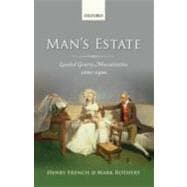Masculinity is an expanding area of gender history. Man's Estate is the first book to focus on a particular social group, the English landed gentry, and to cover a time span of several hundred years. The authors move beyond the study of printed conduct literature, which dominated earlier accounts, by examining the values expressed in family correspondence in order to get closer to social practices. Letters between parents, children, siblings, and other relatives reveal the ways in which masculine norms were produced through everyday interactions and judgements, and help to reconstruct the subjective experiences of elite masculinity in this period. Man's Estate concentrates on four important periods in the life-course for the reproduction of these masculine values: schooling, university, foreign travel, and marriage and family life. These illustrate that there is only limited evidence of sharp-edged differences in values between generations in these families, and that these changes appear not to correspond to the deep 'hegemonic shifts' so often emphasized in existing accounts.
French and Rothery suggest that the fundamental distributions of power and authority within Gentry families remained fairly constant. Conventional ideas of male honour, virtue, reputation, and autonomy were remarkably tenacious, and the continued stress on family heritage, dynastic traditions, and the future security of the family patrimony acted as a brake on changes in the training of young English gentlemen.
The research is based on over 4,000 letters drawn from 19 landed families across England between c. 1680 and c. 1900, and is the result of a three-year research project funded by the Arts and Humanities Research Council.








